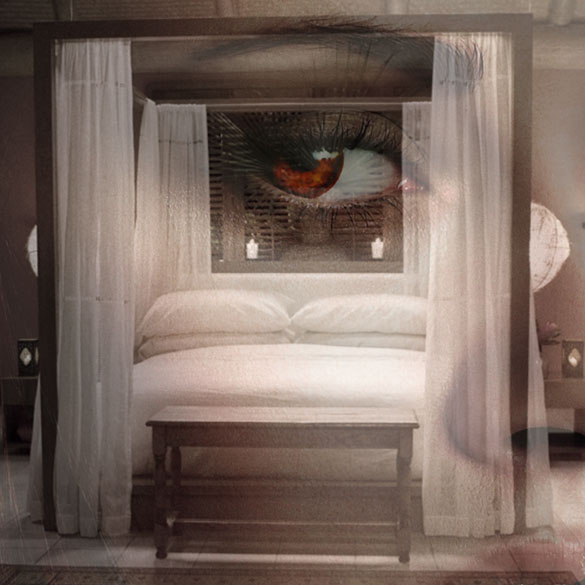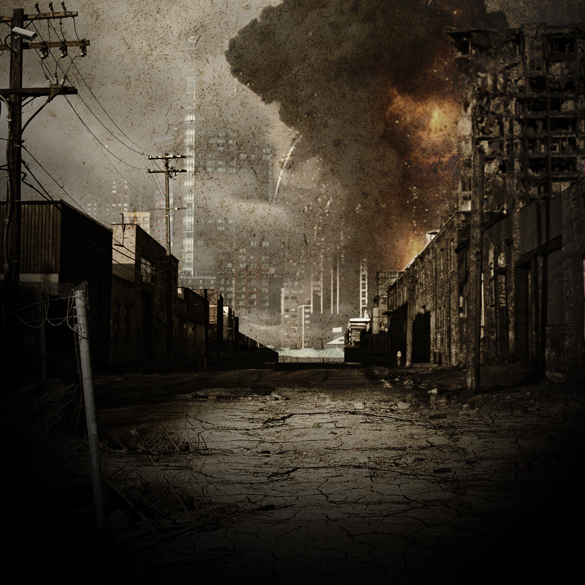
In 1968, The Doors released their third album, Waiting for the Sun. Many, especially those who were parents during the sixties or contemporary teens who have been spoon-fed their conception of the world by mass media, have an image of 1960s musicians and fans madly running around like hippies, for whom every action stereotypically entailed drugs, free love, peace, and long, colorful, often unisex clothing. These hippies, despite their varied political agendas, are often homogenized as politically charged with fun music and an overly peaceful—albeit dulled by drugs –message. However, closer examination of the lyrics of some artists, such as the Doors, indicates precisely opposite. Believing that the sixties solely revolved around the proclivity of drugs to induce forgetfulness and numbness to the world constitutes a failure to realize the multiplicity of meanings psychedelic music holds within its specific political and social context. While the band members steeped themselves in drugs in the selfsame efforts to expand their consciousness as their hippie peers, they reflected an alternate political consciousness to counterculture, rendering them a counter to counterculture. The Doors’ lyrics in their album Waiting for the Sun reflect an acute and exacting sensitivity to the multiplicity of political and social changes during the 1960s, but within a branch of counterculture entirely separate from stereotypical hippie psychedelic rock.
The Doors were different from most bands in the sixties. Their music, other than the top hit singles “Hello, I Love You” and “Light My Fire,” was not mood-lifting and it was far from peaceful. “How do we bring the drama, how do we bring the depth of emotion, how do we bring the pathos, the joy, the sorrow, the terror into rock and roll music?” Ray Manzarek, the Doors’ blues-trained organist, waxes poetic in his account of his life with the Doors. The Doors realized that the times were changing and the “good old days” were over. In the slow, lamenting tune “Summer’s Almost Gone,” the lyrics state that “Morning found us calmly unaware…when summer’s gone, where will we be?” an expression that at once reflects doubt, dismay, and nostalgia for the warm, golden days of times fast disappearing. Manzarek describes the song as “sad and melancholic. A song of the end of innocence. Perhaps of the end of love. Perhaps of the end itself.” Following “Summer’s Almost Gone” on the record is the seasonally appropriate, “Wintertime Love.” The lyrics of this nearly carnivalesque waltz are were probably intended to illustrate displeasure and are easily interpreted as such, as Morrison himself was a literary scholar, and knew literary archetypes like the back of his hand. Winter typically exemplifies disillusionment, death, cold, and sadness in literature. Therefore, it is not surprising that the lyrics lament, “Wintertime winds blow cold this season…Love has been lost, is that the reason / Trying desperately to be free.” According to Morrison’s lyrics, people were unhappy because they were caged and without love. “Your ballroom days are over, baby” Morrison half-growls, half-croons in the last track on the record, “Five to One.” The ballroom days were indeed over. All over the political and social scene everything was changing, and not necessarily for the better.

The Vietnam War changed the way everyone thought about life, and while many artists toyed with the war and its problems in their music, few to none confronted the war so blatantly in their music. “The Unknown Soldier” opens with a false calm and pleasantry, going on to tackle the war, the insensitivity of the majority of Americans to it, and the hypocrisy of our country itself. As Michael Hicks, author of Sixties Rock, notes, The Doors “[added] a delay effect to the organ, then [superimposed] the sound of steeple chimes, followed by crowd noises.” The song also featured military chants, drumrolls, and gunfire. In fact, The Doors brought in rock writers such as Paul Williams (Crawdaddy) and Richard Goldstein (Village Voice) with blank rifles to discharge at Morrison, firing-squad style, to record the background sounds in “The Unknown Soldier.” To illustrate America’s hypocrisy, the lyrics juxtapose highly contrasting images: one of the news being read at the breakfast table, and a common household commodity at the time, a television; one of a soldier being shot in the head. Emphasizing that the bullet is not striking a head that belongs to a person, but rather the “helmet’s head” illustrates the insensitivity of America, as the “helmet’s head” is objectified and depersonalized. Americans have a “hollow shoulder” – that is, no heart.
The last track on the record, “Five to One,” was actually cut down from The Doors’ 17 minute theatrical piece “The Celebration of the Lizard,” but abbreviating the piece did not reduce the song’s antigovernment message. According to Manzarek, the line “They got the guns, but we got the numbers” was something Jim Morrison actually said once in everyday conversation. “‘They can ship us off to Vietnam to be slaughtered in an Asian jungle, but they can’t kill us all. We’ve got the numbers,’” he said. Clearly, The Doors did not feel supportive of the government, and felt equally dismal toward the fate of the troops. Providing the title of the song are the sham statistics “Five to one, baby, one in five / No one here gets out alive now.” The actual song recording is a wonder in and of itself, as an already drunk Morrison choked down some unidentified pills with bourbon before insisting that they record “Five to One” immediately. As Manzarek says, “His rhythm was a little off in the “get together one more time” section…but it was such an impassioned performance that we put it on the record.” This leads us to wonder, is it possible that Morrison’s alcoholism amplified rather than dulled his artistic ability?
Hand in hand with the war were politics, something The Doors were not unaware of. “Not To Touch the Earth” clearly recognizes JFK’s assassination with the lines “Dead president’s corpse in the driver’s car / The engine runs on glue and tar” and goes on to prove cognizance of the tensions with Russia and communism that still existed despite the lack of “real” war between Russia and the U.S. by “not goin’ very far / To the East to meet the Czar.” By choosing to explore the East, The Doors figuratively leave the West by choice, probably because they believe that America’s seeming luxury is a façade: “The mansion is warm at the top of the hill / Rich are the rooms and the comforts there / Red are the arms of luxuriant chairs / And you won’t know a thing till you get inside.”
While music in the sixties regularly confronted the idea of peace and the need for peace, the Doors differ from their contemporaries in that their lyrics do not expound upon the need for world peace but rather the inability to achieve it. In “We Could Be So Good Together,” The Doors critique the world peace movement by simply calling it a lie: “Tell you wicked lies / Tell you ‘bout the world that we’ll invent / Wanton world without lament.” The lie is that peace is a real possibility. The Doors saw the world around them and heard the message of their peers, and concluded that the two models of society, one real and one hoped-for, were as incompatible as oil and water. Unlike what most musical artists professed but probably like what most Americans believed, the Doors had given up on peace, because, as Manzarek explains, at the end of the sixties and the beginning of the seventies a wave of paranoia had swept over the youth of America. Death and the rumor of death had descended upon us, entered our conscious mind, and filtered down into our subconscious, where they lodged like a bad cancer.”
The paranoia and distress of everyday life inevitably led to the search for escape. For many people in the sixties, drugs and alcohol provided precisely that. Drugs often became a social activity with a great deal of pressure involved. The song “Five to One” recognizes that pressure with the line “You see, I gotta go out in this car with these people / And get fucked up.” However, many turned to drugs and alcohol, not purely to “expand their consciousness” but also to simply get away. Naturally, people wanted to escape the violent, vicious world to which they were held victim. The song “Yes, the River Knows” reflects a stolid determination to “drown in mysticated wine,” to “breathe underwater till the end.” In the Latin-influenced ballad “Spanish Caravan,” Morrison begs the caravan to “Take me away.” But perhaps the song most reflective of drug use, although indirectly, is “My Wild Love.” The song describes a woman who asks the Devil to pay for her “riding” or traveling – or escaping. When he refuses, she continues riding, presumably chased by the Devil. She is not being chased by the devils of the past so much as the devils of the present; she is concerned the present will catch up with her if she stops riding. That is, she is concerned that the reality of the world will hit her if she stops numbing herself with drugs, for all she wants is “for the people / to let her go free.”
One has to understand that the songs are symbolic and cannot be taken literally. Morrison was an accomplished reader and poet who, as Manzarek explains, “was borrowing and quoting and paying homage to his masters.” The Doors’ particular branch of counterculture was not of their own invention. Their ideologies – particularly Jim Morrison’s – drew upon 1950s Beatnik counterculture, with darlings such as Jack Kerouac and Allan Ginsberg, famous writers and poets known for their disillusionment, criticism, and individuality. At the end of the lyrics to the theatrical piece “Celebration of the Lizard,” which was never completed to the satisfaction of the band members and was therefore not included on the LP (but was still considered important enough to be featured on the inside cover), Morrison writes, “I am the Lizard King.” While Morrison was eccentric at times, it can be assumed that Jim Morrison did not really believe he was king of the lizards.
Many argue that Jim Morrison was so dependent on alcohol that he, and consequently his lyrics, was numb to the goings-on of the world, both politically and socially. As Manzarek himself acknowledges, “the drinking didn’t exactly help the situation.” However, Morrison had a vested interest in a great deal of his songs’ subjects. One day, when asked why he was feeling low, he admitted that his father had been promoted to the rank of admiral, recognizing his father’s vocation as a “professional killer.” Rock writer Mikal Gilmore expands this idea: “Morrison’s lyrics were a recognition that an older generation had betrayed its children and that this betrayal called for a bitter payback.” The young people were angry that their parents’ generation harbored no qualms about shipping them off to kill people they had never met, while their parents could not imagine why they so profoundly lacked patriotism. Furthermore, the older generation was threatened by blatantly confrontational lyrics such as “The old get older and the young get stronger…/ Gonna win, yeah, we’re takin’ over!” in the still disillusioned but most hopeful sounding song on the album, “Five to One.” The older generation generally took issue with the message the lyrics embodied, which highlighted the generation gap.
While this is less true in the modern day, many believed that the lyrics are offensive and argue that, as the works of drug addicts, the lyrics cannot be taken seriously. However, it is because the lyrics are offensive and written by drug addicts that they ought to be taken seriously, because a propensity to offend and do drugs is what defined the sixties. Some would claim that the sixties were about other things as well, such as peace and Civil Rights, but is it not true that the idea of quitting Vietnam, or of black people being equals to whites offended a lamentably large percent of the population? The ability of a range of issues to spark controversy is a key factor in the modern conception of the sixties. The lyrics are therefore emblematic of the sixties and its politics and society as perceived by a certain people, in this case The Doors and their followers, at the time. According to one letter written to the FBI that encouraged the curtailing of sales of material like Waiting For the Sun and anything similar, the “the great majority of Americans will applaud any efforts to make record racks and newsstands refrain from peddling such filth.”
Waiting for the Sun is considered by many to be a weak album compared with the Doors’ more mature, and conversely, more raw albums because of its oftentimes cryptic lyrics, softer sound, and seemingly softer message. However, it carries deep political and social critiques, spanning over almost the entire scope of human experience in the sixties. It engages the Vietnam War, current events, politics, international relations, peace, drugs, alcohol, love, sex, religion and the loss of religion, and overall, the changing of the times. The Doors’ decisively different analysis of their time through their lyrics is often underestimated, especially in Waiting for the Sun.



Hello, there! This is a very well written piece about The Doors. I’ve actually been working on a similar piece about the political side of The Doors and how the meaning of their music has been lost for a number of reasons. The only thing that I would like to correct you on is about the song “Five to One”. That song was not actually a part of “The Celebration of the Lizard”. The song that was taken from “The Celebration…” was actually “Not To Touch the Earth”. Aside from that, very well written and I will be using you for my piece. Thank you! YAY!